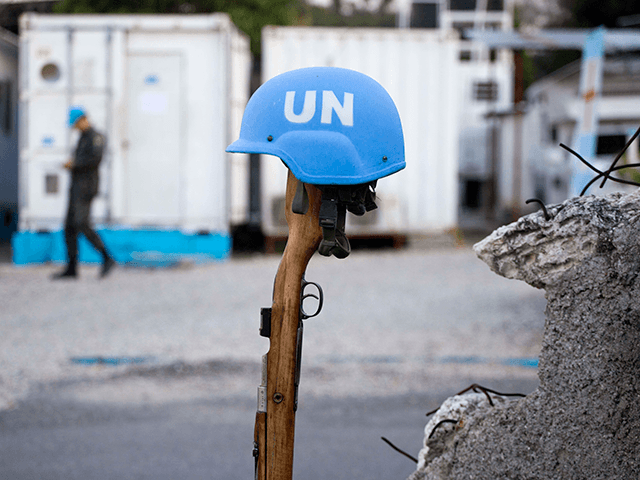The United Nations on Monday objected to Kazakhstan’s use of blue U.N. peacekeeper helmets on some of the troops it deployed to suppress protests over the weekend.
The U.N. statement was prompted by reporters snapping photos of blue-helmeted troops patrolling the streets of Kazakhstan’s major cities, including Almaty, the former national capital and focus of political unrest:
“Any U.N. troop and police contributing countries are to use U.N. insignia only when they are performing their mandated tasks as U.N. peacekeepers,” U.N. spokesman Stephane Dujarric said Monday.
“We have conveyed our concern to the permanent mission of Kazakhstan directly on this issue, and we’ve received assurances from them that this issue had been addressed,” Dujarric said.
Kazakhstan’s mission to the U.N. issued what AFP described as an “awkward response” to the U.N. reprimand:
During the violent riots in Almaty, the Peacekeeping Unit of the Ministry of Defense of Kazakhstan (Kazbat) was put on high alert to assist and protect strategic infrastructure facilities of the city from the terrorists and extremists. Except for the helmets that were worn as part of the official gear of local peacekeepers during the high threat, no ‘UN’ marked equipment was used.
“We didn’t use any U.N. equipment except for the world-famous blue helmets with ‘U.N.’ stenciled on the side” is indeed an awkward statement.
Critics of the authoritarian Kazakh government, and of the United Nations, were not satisfied with this seemingly mild rebuke for a serious abuse of the world body’s authority and prestige, especially since the U.N. Human Rights Council has been completely silent on the excessive use of force by its newest member:
Humanitarian law expert Eric David of the Free University of Brussels told Radio Free Europe (RFE) the photos of blue-helmeted soldiers on the streets of Almaty suggested “a gross misuse by the authorities of the troops who wore those helmets.”
David said if Kazakh officials are proven to have ordered the use of the blue helmets without proper U.N. authorization, they would “trigger the international responsibility of Kazakhstan for an intentionally wrongful act.”
In fact, as RFE pointed out, if Kazakh security forces seriously injured or killed protesters while wearing U.N. uniforms without authorization, those actions could be prosecuted as war crimes.
David suggested all parties involved would prefer to classify the Kazakhstan uprising as a purely “internal” affair – despite the deployment of Russian troops – so the blue helmet abuse would be treated as “unlawful, but not a war crime.”
The Washington Post quoted international security expert Charles Hunt of Australia’s RMIT University calling it “plausible, but not convincing” that Kazakh service members “wore the U.N. helmets because they were the only headgear readily available.”
The Post wryly noted this was especially implausible because Kazakh President Kassym-Jomart Tokayev is a former top United Nations official, and he touted his “extensive” management experience when he assumed the presidency.
RFE reported Belarusian troops were also deployed in Kazakhstan under the aegis of the regional Collective Security Treaty Organization (CSTO) alliance, and they also appeared to be wearing ersatz U.N. peacekeeper badges, although in their case it was the insignia of a Belarusian “peacekeeping company” that strongly resembles the U.N. flag.

COMMENTS
Please let us know if you're having issues with commenting.